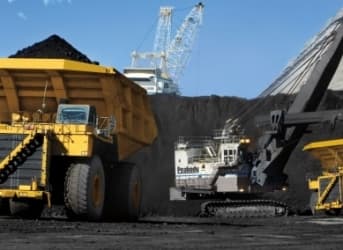It probably seemed unlikely that the outlook for coal could get much worse, but the industry’s prospects continue to deteriorate.
Both worldwide and within the United States, coal is suffering from rock bottom prices, oversupply, and weak demand. Metallurgical coal prices have dropped below $90 per metric ton, their lowest levels in a decade.
The reasons are multiple, but boil down to an increasing shift away from coal due to market forces as well as regulatory pressure. The U.S. is moving towards natural gas, and China – which accounts for about half of global coal demand – is also trying to cut its coal consumption. At the same time, China’s economy has slowed. China’s imports of coal for September dropped by 16 percent compared to the same month a year ago, forcing European coal prices to drop to a record low. Related: Case Builds For Argentina As The World’s Next Shale Hotspot
As a result of depressed market conditions, coal producers around the U.S. are slashing production, as low prices make mining unprofitable. SNL published an in-depth analysis of U.S. coal companies that are scaling back output, with Central Appalachia reporting the sharpest cut backs. Just to take a few examples: Patriot Coal’s Hobet Surface Mine saw coal production fall by 43.5 percent in the third quarter of this year from the same period in 2014; its Peerless Rachel Mine saw output fall by 22 percent; and production from its Samples Mine fell by 43 percent.
Patriot Coal and Alpha Natural Resources have already filed for Chapter 11 Bankruptcy, and others could soon follow. Central Appalachia saw its coal output collectively fall by 12.3 percent in the third quarter.
“A spate of coal defaults has resulted from unsustainably high debt leverage from past acquisitions amid an environment of weak coal pricing,” ratings agency Fitch said in a new report. “The low pricing and defaults were driven by over-supply of steam coal and metallurgical coal, burdensome regulations, and competition from low priced natural gas for electric generation business.” Related: Ludicrous Proposal By Venezuela’s Maduro To Combat Oil Price Damage
The downturn in coal production is inflicting a lot of damage on rail companies who move shipments of coal around the United States. CSX, a major rail company, is reducing operations as coal traffic slows. The company has lost over $1 billion in coal revenues over the past four years.
Compounding the problem for coal, it appears that some in the oil and gas industry are starting to separate themselves from the black rock, as international pressure to address climate change continues to grow. Several large integrated oil and gas companies in Europe published a letter of support for a climate agreement at the UN negotiations in Paris in December. Signed by companies like Total, BP, Eni, Repsol, Statoil, and even Saudi Aramco, the companies came out in favor of an agreement that will keep the world below the 2-degree Celsius target that is commonly cited as a key threshold in climate negotiations.
The move is an effort to head off the growing stigmatization facing oil and gas companies, as worries over the climate crisis grow. But by doing so, oil and gas companies are throwing coal under the bus. Any climate policies will target coal first and foremost, as it is one of the dirtiest forms of energy. As coal is phased out around the world under strict limits on carbon, natural gas will likely be able to gain market share. Integrated oil companies, which also produce large volumes of natural gas, will be able to gain at the expense of coal, even if they have to pay some penalty for their own carbon emissions. Related: Cheap Gas Claims Another Nuclear Victim
That could leave coal miners with a growing pile of stranded assets on its hands. According to Moody’s Investors Service, half of the world’s coal reserves are unprofitable to extract at today’s prices. If demand for coal flatlines, prices won’t rebound.
In the new Fitch report, the ratings agency says that if Peabody and Arch Coal – two of the industry’s larger producers – declare bankruptcy, the bond default rate for the industry could exceed 50 percent. Bond yields have shot up after a wave of defaults in North America. Assets are losing value, and what makes the bust different from previous downturns is that the prospect of recovery seems more remote. There are few buyers willing to rescue embattled companies, making defaults and production cutbacks impossible to avoid.
While the situation is dire, there is a chance that market conditions could darken. Citi says there is a 55 percent chance of “a China-led global recession” in the next year. That would be doomsday scenario for the coal industry.
By Nick Cunningham of Oilprice.com
More Top Reads From Oilprice.com:
- The End Of The Oil Major?
- Oil Sands Down But Far From Out
- Current Oil Price Rally Will Fizzle Out Say Analysts


















